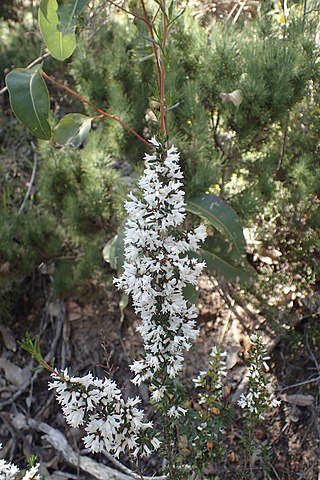
Cryptandra arbutiflora, commonly known as waxy cryptandra, is a species of flowering plant in the family Rhamnaceae and is endemic to the southwest of Western Australia. It is a shrub with spiny branches, elliptic to linear leaves and tube-shaped white flowers.
Cryptandra beverleyensis is a species of flowering plant in the family Rhamnaceae and is endemic to the southwest of Western Australia. It is a shrub with narrowly oblong leaves and clusters of white, tube-shaped flowers.
Cryptandra congesta is a flowering plant in the family Rhamnaceae and is endemic to a restricted area of the south-west of Western Australia. It is a low, spreading shrub with narrowly egg-shaped or narrowly oblong leaves and clusters of white, tube-shaped flowers.
Cryptandra craigiae is a flowering plant in the family Rhamnaceae and is endemic to a restricted area of southern Western Australia. It is a shrub with linear leaves and dense clusters of white or cream-coloured, tube-shaped flowers.
Cryptandra dielsii is a flowering plant in the family Rhamnaceae and is endemic to the south-west of Western Australia. It is a spreading shrub with linear to narrowly oblong leaves and dense clusters of white, hairy, tube-shaped flowers.
Cryptandra distigma is a flowering plant in the family Rhamnaceae and is endemic to inland Western Australia. It is a shrub with oblong or narrowly egg-shaped leaves and clusters of white to cream-coloured, tube-shaped flowers.
Cryptandra exserta is a flowering plant in the family Rhamnaceae and is endemic to inland Western Australia. It is a shrub with narrowly oblong leaves and clusters of white, tube-shaped flowers.
Stenanthemum bremerense is a species of flowering plant in the family Rhamnaceae and is endemic to the southwest of Western Australia. It is an erect, or low spreading shrub with hairy young stems, broadly egg-shaped leaves and densely hairy heads of tube-shaped flowers, sometimes with whitish floral leaves.
Cryptandra imbricata is a flowering plant in the family Rhamnaceae and is endemic to the southwest of Western Australia. It is a spreading shrub with spiny, interlaced branchlets, narrowly oblong to linear leaves and spike-like clusters of white, tube-shaped flowers.
Cryptandra inconspicua is a flowering plant in the family Rhamnaceae and is endemic to the southwest of Western Australia. It is a small, spreading shrub with narrowly elliptic to egg-shaped leaves and head-like clusters of white, tube-shaped flowers.
Cryptandra intermedia is a flowering plant in the family Rhamnaceae and is endemic to the southwest of Western Australia. It is a small shrub, usually with spiny branchlets, elliptic to linear leaves and spike-like clusters of white, tube-shaped flowers.
Cryptandra intonsa is a flowering plant in the family Rhamnaceae and is endemic to inland Western Australia. It is an erect or spreading shrub with linear to narrowly oblong leaves and white or cream-coloured, tube-shaped flowers arranged in head-like clusters.
Stenanthemum limitatum is a species of flowering plant in the family Rhamnaceae and is endemic to the southwest of Western Australia. It is an erect or straggling shrub with sparsely hairy young stems, egg-shaped to fan-shaped leaves and greyish, softly-hairy heads of white or cream-coloured flowers.
Cryptandra micrantha is a flowering plant in the family Rhamnaceae and is endemic to the southwest of Western Australia. It is a prostrate or upright shrub with spiny branchlets, narrowly oblong to elliptic leaves and dense clusters of white or cream-coloured, tube-shaped flowers.
Cryptandra minutifolia is a flowering plant in the family Rhamnaceae and is endemic to the south-west of Western Australia. It is a spreading shrub with oblong to elliptic leaves and clusters of white or pink, tube-shaped flowers.
Cryptandra monticola is a flowering plant in the family Rhamnaceae and is endemic to the south-west of Western Australia. It is an erect or spreading shrub with linear or narrowly oblong to elliptic leaves and head-like clusters of white, tube-shaped flowers.
Stenanthemum poicilum is a species of flowering plant in the family Rhamnaceae and is endemic to the south-west of Western Australia. It is an erect or low-lying shrub with hairy young stems, broadly egg-shaped leaves with the narrower end towards the base, and clusters of densely hairy white flowers.

Cryptandra recurva is a flowering plant in the family Rhamnaceae and is endemic to Western Australia. It is an erect, spreading shrub with densely hairy young stems, narrowly oblong to narrowly egg-shaped leaves and clusters of white, cream-coloured or off-white, tube-shaped flowers.
Cryptandra stellulata is a flowering plant in the family Rhamnaceae and is endemic to the southwest of Western Australia. It is a shrub with spiny branches, narrowly oblong to linear leaves and spike-like clusters of 2 to 12 white, tube-shaped flowers.
Cryptandra wilsonii is a flowering plant in the family Rhamnaceae and is endemic to the south-west of Western Australia. It is a shrub with hairy young stems, oblong to narrowly oblong leaves and clusters of white, tube-shaped flowers arranged in small clusters.


